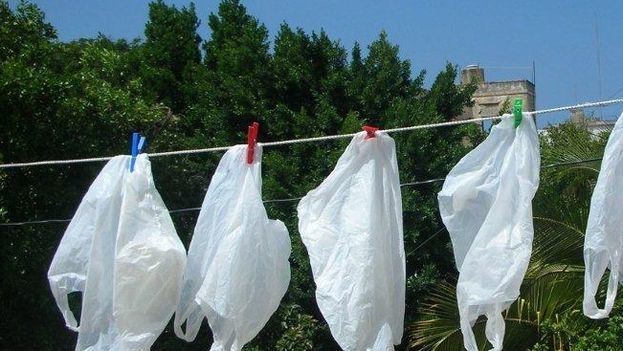
![]() EFE (Via 14ymedio), Havana, 9 February 2017 — In Cuba, take-away pizza is eaten on piece of paper, people go to the market with their own bags, and rum bottles are reincarnated as sauce containers. It is not that the country has an admirable environmental awareness, but that there is a perpetual lack of packaging and containers that sharpens the island ingenuity.
EFE (Via 14ymedio), Havana, 9 February 2017 — In Cuba, take-away pizza is eaten on piece of paper, people go to the market with their own bags, and rum bottles are reincarnated as sauce containers. It is not that the country has an admirable environmental awareness, but that there is a perpetual lack of packaging and containers that sharpens the island ingenuity.
By necessity, recycling has become a daily habit for Cubans, who never forget to grab a jaba (bag) when they leave home, and even wash and dry them to reuse until they are nothing but shreds.
“A Cuban is composed of head, trunk, limbs and jabita,” quipped a comedian in a celebrated monologue that became popular in the Caribbean country two decades ago.
This pressing demand explains the success of PACGRAF at the International Fair celebrated this week in Havana “with the aim of generating new business opportunities and working with the main buyers and distributors for the production of packaging in Cuba,” according to its organizers.
Nearly 50 companies from eleven countries have attended the event to try to promote a sector that the Vice Minister of Industries, José Álvarez, considered during his inauguration as “strategic to guaranteeing economic development and especially boosting the pharmaceutical, agro-food and tourism industries.”
The lack of packaging and containers is another face of Cuba’s daily shortages, attributable to several factors depending on who is asking: the official response is the United States trade embargo on the island is responsible, while ordinary citizens blame the state apparatus for its lack of foresight.
The Cuban government has invested more than 40 million dollars in packaging, paper and cardboard, in the last three years, said the director of Packaging and Containers of the Ministry of Industry, Juana Iris Herrera, who anticipated a new investment to produce more carbdoard boxes.
Some packaging and containers are so complicated to get through normal channels that they have become coveted objects of desire. Among them, the large cardboard boxes used in international moves, which in Cuba have the value of a war trophy.
Another example is the square pizza boxes. Some fortunate private restaurants have found alternative “supply” routes and even have them customized – and many charge for them at about 50 cents a box – but in other places the calculations fail and they are suddenly without packaging.
“If there are no boxes, if they want pizza to take away, they have to bring a plate,” explains the waitress of a private pizzeria in the Havana neighborhood of Miramar.
Cans that drinks come in are cut in half to serve as containers for flans and other delicacies sold in street stalls, and in the farm markets rum bottles have a second life as containers for honey or spicy sauces.
“Cubans are sick of (addicted to) the bags,” says Ruben Valladares, a freelancer who has been working for the last five years at the PACGRAF fair.
The company, which like so many entrepreneurs started as a precarious and “rustic” home-based business, today supplies several state-owned companies, numerous private businesses and even has become a peculiar exponent of the thaw with the US through an alliance with Commonwealth Packaging Company, a firm from the neighboring country that wanted to bet on Cuba.
“The first packaging, a new relationship” is the slogan of this joint venture.
Another company present at the fair is the Spanish Siepla, which sells machines with technology to make plastic containers such as bottles, decanters and jars.
“The needs of the country are immense, there is a lot of demand,” says the sales manager of the firm, Josep Puig.
Bottles for soap, deodorant containers or containers for jam and honey are some of the products that can be made with these machines, a plethora of containers that will have a long life in Cuba, the country where nothing is thrown out.
